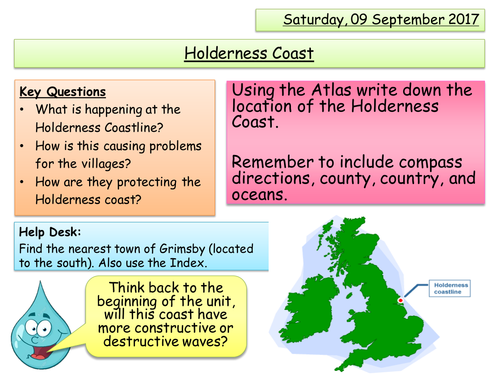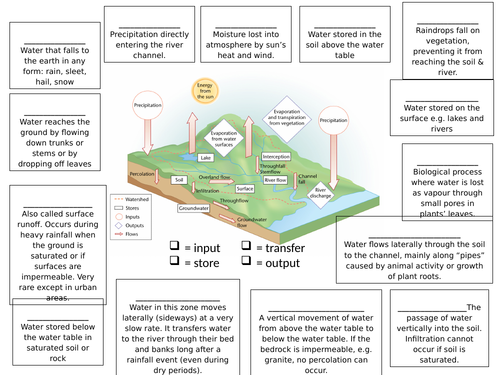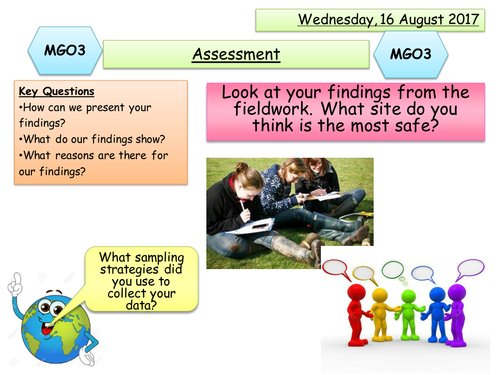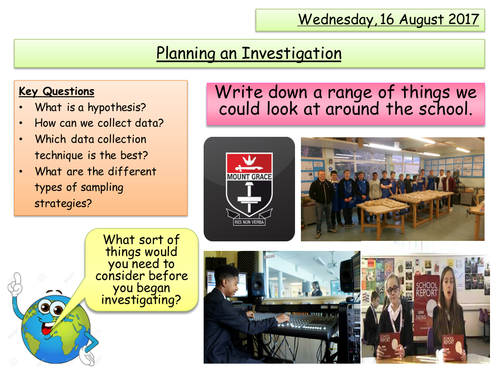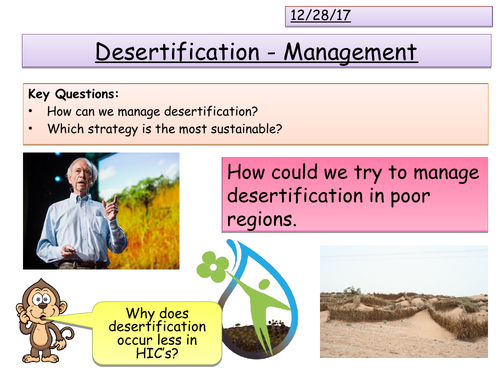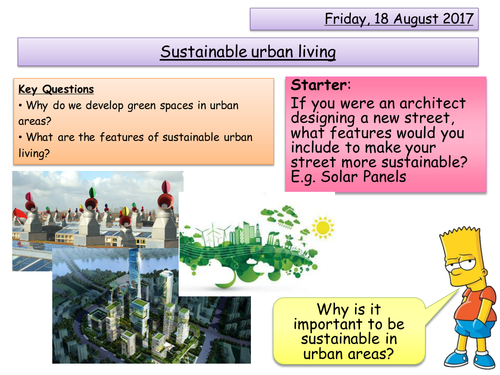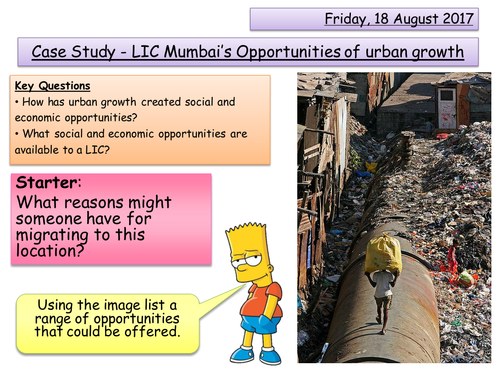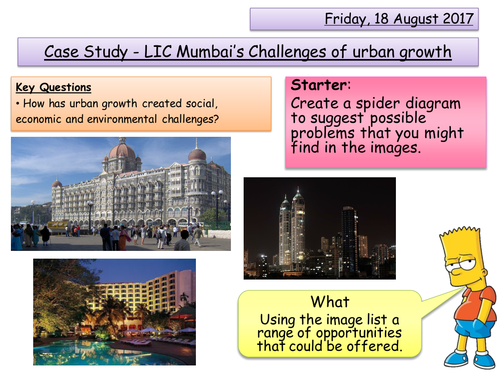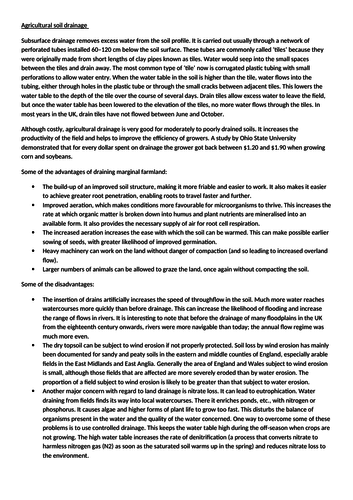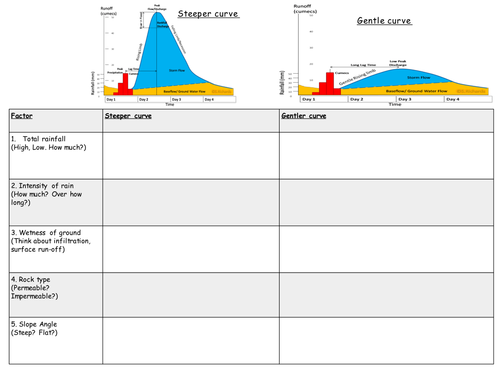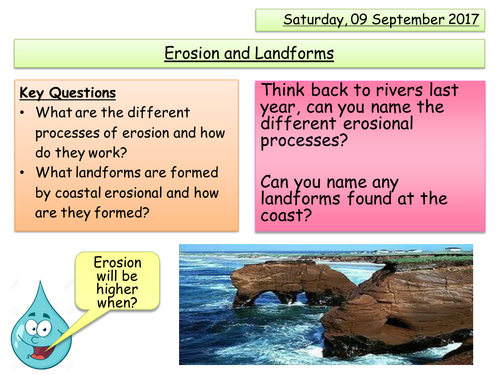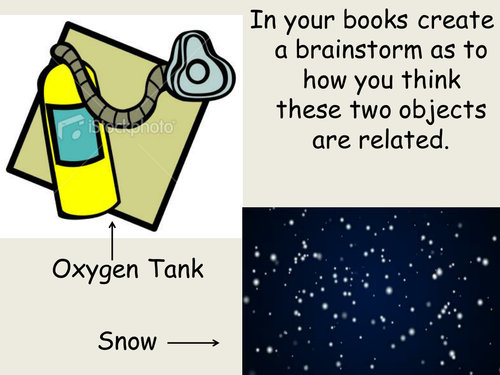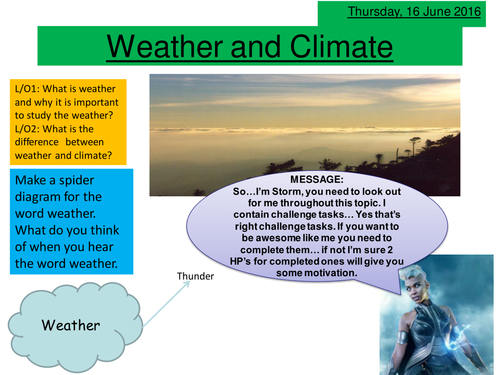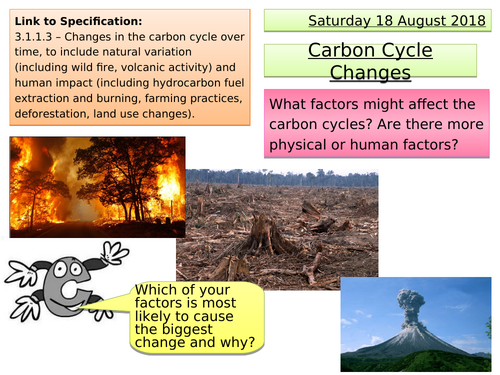
156Uploads
234k+Views
294k+Downloads
All resources

Holderness Coast
This lesson aims to allow students to gain an understanding of what is happening at the Holderness Coastline. It looks at the erosion taking place and the impact this is having on the local area. This is then followed by looking at the management strategies that Holderness has implement and the impact this has caused.
By the end of the lesson students will be able to answer the following key questions:
- What is happening at the Holderness Coastline?
- How is this causing problems for the villages?
- How are they protecting the Holderness coast?

Drainage Basin - AQA A Level
This lesson is based around the new AQA A Level specification. This is a lesson in the unit titled Water and Carbon Cycles. The main aim of this lesson is to cover the following element of the specification:
3.1.1.2 – The water cycle
Drainage basins as open systems – inputs and outputs, to include precipitation, evapotranspiration and runoff; stores and flows, to include interception, surface, soil water, groundwater and channel storage; stemflow, infiltration overland flow, and channel flow. Concept of water balance.
Any pages referenced are from the Oxford physical textbook.
Please note I do not own the rights to any of the images used in this powerpoint.

Planning an Investigation - Presentation, Analysis and Conclusion
This lesson aims to get students to think about how to present, analyse and draw conclusion from data they have collected in the field. This is the 2nd lesson and links to planning an investigation. It gets students to pick appropriate presentation methods, describe and explain their results and to draw conclusions of their investigation. By the end of the lesson students will be able to answer the following key questions:
How can we present your findings?
What do our findings show?
What reasons are there for our findings?

Planning an Investigation
This lesson aims to get students involved in the planning of their own investigation. This is aimed at year 7, completing their very first piece of fieldwork. The fieldwork is based around locating the most unsafe location within their school. It gets students examining different data collection methods, and the sampling strategies they will use. Although this lesson mentions a school, it is easily adaptable to mention your own individual school. By the end of the lesson students will be able to answer the following key questions:
What is a hypothesis?
How can we collect data?
Which data collection technique is the best?
What are the different types of sampling strategies?

Managing Desertification
This lesson is based around the new AQA GCSE specification. This is a lesson in the unit titled Living World. The main aim of this lesson is to cover the following element of the specification:
- Strategies used to reduce the risk of desertification – water and soil management, tree planting and use of appropriate technology.
NOTE - When it refers to page numbers please refer to the information provided.

Sustainable Urban Living
This lesson is based around the new AQA GCSE Specification. This is a lesson in the unit titled Urban Issues and Challenges. The main aim of this lesson is cover the following element of the specification:
Features of sustainable urban living:
• water and energy conservation
• waste recycling
• creating green space.

A Major City - Mumbai's Opportunities
This lesson is the second part of the major city you must cover in the new AQA GCSE specification. This lesson aims to cover the following element from the specification:
- how urban growth has created opportunities:
• social: access to services – health and education; access to
resources – water supply, energy
• economic: how urban industrial areas can be a stimulus for
economic development
NOTE - When it refers to page numbers please refer to the factfile document attached.

A Major City - Mumbai's Challenges
This lesson is the third part of the major city you must cover in the new AQA GCSE specification. This lesson aims to cover the following element from the specification:
- how urban growth has created challenges:
• managing urban growth – slums, squatter settlements
• providing clean water, sanitation systems and energy
• providing access to services – health and education
• reducing unemployment and crime
• managing environmental issues – waste disposal, air and water pollution, traffic congestion.

Water Cycle Changes - AQA A Level
This lesson is based around the new AQA A Level specification. This is a lesson in the unit titled Water and Carbon Cycles. The main aim of this lesson is to cover the following element of the specification:
3.1.1.2 – Changes in the water cycle over time to include natural variation including storm events, seasonal changes and human impact including farming practices, land use change and water abstraction.
Any pages referenced are from the Oxford physical textbook.
Please note I do not own the rights to any of the images used in this powerpoint.

Flood Risk and Hydrographs
This lesson is based around the new AQA GCSE specification. This is a lesson in the unit titled River landscapes in the UK. The main aim of this lesson is to cover the following element of the specification:
How physical and human factors affect the flood risk - precipitation, geology, relief and land use.
The use of hydrographs to show the relationship between precipitation and discharge.
Bundle

AQA GCSE GeographyRevision Bundle
In this Bundle you will get 2 workbooks covering the AQA GCSE Geography exam. It covers the following topics:
Paper 1:
Challenge of Natural Hazards
Living World - Tropical Rainforest and Hot Deserts
Physical Landscapes in the UK - Coasts and Rivers
Paper 2:
Urban Issues and Challenges
Changing Economic World
Challenge of Resource Management - Resources and energy
Please note that this is full editable so that you can change the case studies/examples to match those that you teach.

A Systems Approach - AQA A Level
This lesson is based around the new AQA A Level specification. This is a lesson in the unit titled Water and Carbon Cycles. The main aim of this lesson is to cover the following element of the specification:
3.1.1.1 – Water and carbon cycles as natural systems.
Systems in physical geography: systems concept and their application to the water and carbon cycle inputs – outputs, energy, stores/components, flows/transfers, positive/negative feedback, dynamic equilibrium
Any pages referenced are from the Oxford physical textbook.
Please note I do not own the rights to any of the images used in this powerpoint.

Urban Regeneration - Birmingham
This lesson is based around the new AQA GCSE Specification. This is a lesson in the unit titled Urban Issues and Challenges. The main aim of this lesson is cover the following element of the specification:
An example of an urban regeneration project to show:
• reasons why the area needed regeneration
• the main features of the project.
NOTE: If page numbers are mention then the figure is either already on the powerpoint or all relevant writing can be found in the factfile provided. If you would prefer to use the actual textbook this is the Cambridge gcse book.
NOTE: This lesson is good to follow on from my other lessons on Birmingham which are linked to the UK’s major city element.

Glaciation and Rivers
This resource contains all the materials to teach a full unit titled Glaciation and Rivers. This is designed for year 7’s however could easily be edited to cater for slightly older year groups.
This resource contains all powerpoints, resources, homeworks and assessment materials. Lesson titles are as follows:
Lesson 1 - Glaciation
Lesson 2 - Glacial Processes
Lesson 3 - Erosional Landforms Part 1
Lesson 4 - Erosional Landforms Part 2
Lesson 5 - Transportational and Depositional Landforms
Lesson 6 - Using Glacial Landforms
Lesson 7 - Mid Unit Assessment
Lesson 8 - The Water Cycle
Lesson 9 - Drainage Basin
Lesson 10 - Fluvial Processes
Lesson 11 - Upper Course Landforms
Lesson 12 - Middle Course Landforms
Lesson 13 - Causes of Flooding
Lesson 14 - River Management
Lesson 15 - End of Unit Assessment
Plus 2 additional pieces of material:
Mid Unit Feedback
End of Unit Feedback

Monsoons
This lesson is the fourth in a sequence of lessons for the topic Asia. This lesson aims to get students to think about the following:
What a monsoon is
Monsoon formation
Impacts of a monsoon

Erosional Landforms - Coasts
This lessons aims to allow students to gain an understanding of the different erosional processes that occur along the coast, followed by how these create a range of coastal landforms.
By the end of the lesson students will be able to answer the following key questions:
- What are the different processes of erosion and how do they work?
- What landforms are formed by coastal erosional and how are they formed?

Migration and Urbanisation
This lesson is based around the new AQA GCSE Specification. This is the second lesson in the unit titled Urban Issues and Challenges. The main aim of this lesson is cover the following element of the specification:
- Factors affecting the rate of urbanisation – migration (push–pull theory), natural increase.

Mount Everest
A lesson based on a climb up Mount Everest, it allows students to develop their decision making and gain a better understanding of what mount Everest is like.

Weather and Climate
This is a lesson, aimed to get students to think about the difference between weather and climate. In addition to thinking about how weather affects people.

Carbon Cycle Changes - AQA A Level
This lesson is based around the new AQA A Level specification. This is a lesson in the unit titled Water and Carbon Cycles. The main aim of this lesson is to cover the following element of the specification:
3.1.1.3 – Changes in the carbon cycle over time, to include natural variation (including wild fire, volcanic activity) and human impact (including hydrocarbon fuel extraction and burning, farming practices, deforestation, land use changes).
Any pages referenced are from the Oxford physical textbook.
Please note I do not own the rights to any of the images used in this powerpoint.

